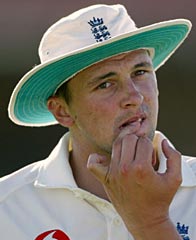If strike bowler Steve Harmison had been born a few years earlier, he would probably have disappeared without trace.
Around Durham, he would have earned a name for himself as a young tearaway who, for a few seasons at least, frightened rather than dismissed batsmen.
 But he would never have got to Dhaka, Sydney or Jamaica. He would never have boasted figures of 12.3-8-12-7 at Sabina Park, and West Indies would not have been dismissed for 47, the lowest Test total in their history.
But he would never have got to Dhaka, Sydney or Jamaica. He would never have boasted figures of 12.3-8-12-7 at Sabina Park, and West Indies would not have been dismissed for 47, the lowest Test total in their history.
He would probably, indeed, have been about as famous as Troy Cooley.
The Australian was once a genuinely quick but wild bowler. A bit, in fact, like the young Harmison.
He played for Tasmania, on and off, for around 10 years, struggling with overstepping and injuries, before calling it a day in 1995.
Ironically Cooley, as England bowling coach, is today feeding Harmison the biomechanical expertise, backed up by technological analysis, which he himself could have profited from.
The results have been extraordinary.
When Harmison first played for England less than two years ago, he was red-raw.
His arms -- "long levers," Cooley calls them -- swung to left and right, he had a ragged jump at the crease and was not strong enough to stop his pelvis tilting as he landed. He failed to cock his wrist and the ball sprayed everywhere.
"He had a bit of a balance problem," said Cooley. "At his size, you need to be stable."
The unstable Harmison was dropped after one game.
On his return, he was soon being presented as a figure of fun for scatter-gunning eight wides in a single over in a tour match in Australia in 2002-3.
Cooley, however, who would soon replace Graham Dilley as England's bowling coach, was excited. "Yes, I definitely saw he had something special -- I mean, he is six feet five inches (1.95 metres) tall. When you add the length of his arm, the ball is coming down from out of the clouds.
"And he was getting it right occasionally."
NATURAL PACE
During the Ashes, Harmison's nine wickets cost 50.55 runs each but he managed to hurry up a few Australians, something no Englishman had done in a while, with his natural pace and bounce.
A year later, now teamed up with Cooley, things really began to click.
In his first 11 Tests, Harmison had taken 32 wickets at a less-than-convincing 35.50. He impressed in Bangladesh, gaining confidence on flat, unresponsive tracks, but was then injured and flew home early to end up in the gym of his beloved Newcastle United.
"He worked really hard on his core conditioning and leg strength," Cooley said. "It was a key issue. Without that, he couldn't hold the rest of the changes we wanted to drip-feed into him.
"If you are not stable through the crease and fighting left and right instead of taking the momentum to the target, you are not going to get a good bowling position."
The transformation is best reflected in the statistics.
Harmison mark two, his arms pumping back and forward rather than to the sides and with an immense, smooth leap at the crease, has taken 53 wickets at 16.69 runs apiece in his last eight matches.
There have been three man-of-the-match awards and two prizes for man of the series. And a move from nowhere to second in the world rankings.
In the West Indies, they saw a Curtley Ambrose look-alike.
New Zealand captain Stephen Fleming talked of a mixture of Glenn McGrath's consistency and Brett Lee's explosive pace.
"Harmison was outstanding. He was the go-to man every time England were in trouble," Fleming said after his side had been whitewashed this month.
Cooley, however, avoids comparisons.
"Who does he remind me of? Stephen Harmison. He's unique."
His success, he says, is down to Harmison's own hard work and ability to adapt. But yes, the coaching and the technology have probably helped.
"I'm a great believer that the cream rises to the top. Without the knowledge we can give him, Steve may still have found another way to make it.
"Today, you have some pretty good biomechanical evidence to show players. In the old days, they just told you to stop doing things without explaining why they were happening.
"Now we can explain, so it's easier for players to buy into it. But they take the responsibility to get organised. The success is down to Stephen."







